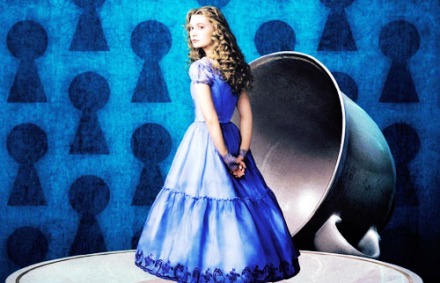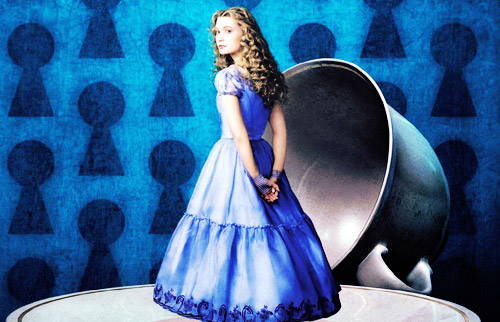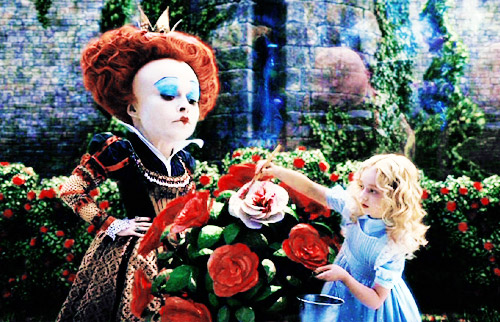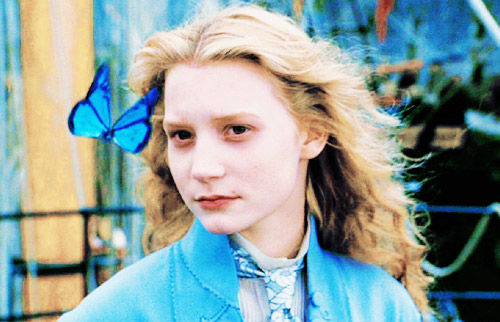I admit, I did not grow up with a fondness for Lewis Carol’s books. They were interesting but largely nonsensical, a random sequence of events thrown together for the amusement of children. But I have a weakness for Tim Burton, so I approached the film with interest, knowing he would put his own particular creative stamp on it. Many people hate this movie, and I can see why, but I like it for a variety of reasons, not the least of which being the question of, “Was it all a dream?”
We assume that it wasn’t, that Underland is a real place, that Alice is quite “sane,” and that all of these events truly happened to her; but the fact that so many of them symbolically parallel aspects of real life and explore her psyche suggest that it’s not unreasonable to consider the fact that Underland and her adventures there are her mind trying to deal with difficult questions in reality, as a form of escapism. It is not insanity, but Alice reasoning things out in her imagination.
Alice, like many Tim Burton characters, is at a crossroads in her life; she stands between adolescence and adulthood and must choose one. The prospect of marriage, because it is the sensible thing to do and what is “done” (“everyone expects it,” she says halfheartedly), looms before her… a bit like a Jabberw0ky that must be slain in order for her to find what she truly wants. Her tyrannical potential mother in law bears more than a passing resemblance to the psychotic Red Queen, in terms of her general dislike for anything being out of order or control, not how she likes it, and distaste for innocent life (“I hate rabbits,” she says; “I like setting the dogs on them”). It is a bit like OFF WITH THEIR HEADS, is it not?
The absurd and rather stupid twin boys that turn up in Underland reflect Alice’s contempt for a pair of giggling, silly, slightly malicious twin girls in reality. The sense of urgency throughout her Underland adventure, as a certain day whose events are foretold looms before her with everyone’s expectations resting on her shoulders, is a reminder that “time is running out” for her to be a child, and that the day everyone expects is soon to arrive… the day she grows up, gets married, and fulfills their expectations. Alice is in an emotional crisis, uncertain of who she is and what she wants. She is cowed at first around all of these people, who dismiss her whimsical, imaginative nature as being preoccupied with nonsense, when all she does is be amused at others’ antics and think about what it might be like to fly. She has, as the Hatter puts it, “lost her muchness.”
But what IS her “Muchness”? It is Alice. Her sense of self. Her knowledge of what she wants. Her proving to herself through slaying the Jabberw0ky that she is strong and capable enough to turn her back on what is “expected” of her, and become the person she wants to be… to partner in her father’s business, to carry his vision on and even expand on it, to make her own decisions and be her own person. Absolem, the caterpillar, stitches himself neatly into a cocoon toward the end of the story while telling her to, in a sense, grow up and face her responsibilities; what follows, in the fight to the death with the Jabberw0ky, is Alice breaking out of her cocoon, out of a period of intense introspection, self-analysis, and doubt, to stretch her proverbial wings and finally claim for herself what she wants most: the freedom to be herself, to be an adult but still hold to her powerful imagination and sense of wonder. Absolem, now a blue butterfly, turns up at the end, to fly ahead of her into the unknown as she embarks on a much greater adventure – life, to symbolize that Alice is now a butterfly.
The film is full of delightful Tim Burton signatures (curly trees, absurd situations, and all) and has his usual whimsical charm, but superficial as it may seem at first glance, a story more style than substance, it’s actually a journey of self-discovery, full of metaphors about the human existence and the transition from childhood into adulthood. And perhaps that is why I like it, because underneath the seriousness with which I view life, there’s a hint of Alice in me too.




I had analysed this throughout the movie I also resemble the max hatter as the father in the beginning as he states that the best people are “mad/bonkers”. i also love the colour contrast with the white queen and her dark features/makeup with the bright insanity of the red queen!
I’d like to add that Alice is also a strong female character and the fact that the wedding overwhelms her and that she has to prove her bravery in a fight against the Jabberwoky shows a girl whos rather with her own specific mind instead of being a usual housewife
Well put, I want to watch this movie now!
I’ve only seen it once, but I quite enjoyed it. I should watched it again soon.
Have not seen it yet, but I’m very interested. Especially after this. Symbolism? Never get tired of it. And I’m a Tim Burton fan too, so that is another incentive. Always been a fan of the interestingly weird.
I hope you enjoy it. My father’s words were, in fact, “weeeeird,” which, of course, Tim Burton does very well!
I really like this version, though I’ve nothing to compare it to in terms of another live-action adaptation. Your post definitely makes me want to rewatch Burton’s version and I’m particularly curious about the eventual sequel that’s in the works! Wonder what will come of this!?
Fabulous post. As always. 🙂
I’m intrigued by the sequel as well, although thus far there is not much circulating about it. Oh, well. Always something to look forward to!